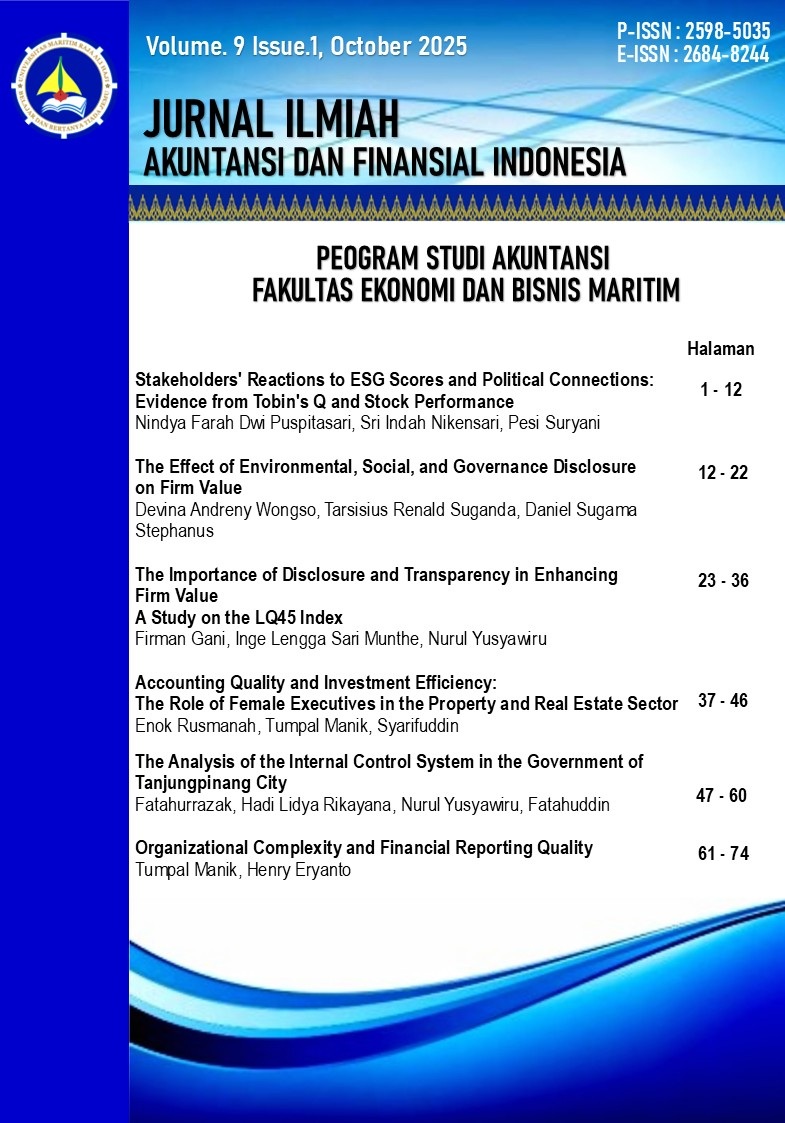Tumpal Manik Organizational Complexity and Financial Reporting Quality
DOI:
https://doi.org/10.31629/rwrmac96Keywords:
Reporting Quality, Organizational Complexity and Finansial, Subsidiary, Segment, Human resourceAbstract
This study examines the relationship between organizational complexity in the context of management and the quality of financial reporting. Organizational complexity is analyzed through four key components: subsidiary management, segment operation management, and human resource management. The findings provide evidence that managing organizational complexity through effective governance and sound management practices supports greater accuracy, transparency, and reliability in financial reporting. Such management practices also help prevent reporting errors and fraud. Consequently, organizational complexity can significantly influence the quality of financial reporting. Drawing on insights from agency theory and information asymmetry, this paper discusses how increasing complexity may reduce reporting quality and proposes mechanisms to mitigate its adverse effects
Downloads
References
Alsmady, A. A. (2022). Quality of financial reporting, external audit, earnings power and companies performance: The case of Gulf Corporate Council Countries. Research in Globalization, 5, 100093. https://doi.org/10.1016/j.resglo.2022.100093
Argimón, I., Rodriguez, M., & Maria. (2021). Business Complexity and Geographic Expansion in Banking. SSRN Electronic Journal. https://doi.org/10.2139/ssrn.3911800
Asyik, N. F., Agustia, D., & Muchlis, M. (2023). Valuation of financial reporting quality: is it an issue in the firm’s valuation? Asian Journal of Accounting Research. https://doi.org/10.1108/AJAR-08-2022-0251
Bajra, U., & Čadež, S. (2018). Audit committees and financial reporting quality: The 8th EU Company Law Directive perspective. Economic Systems, 42(1), 151–163. https://doi.org/10.1016/j.ecosys.2017.03.002
Billett, M. T., & Yu, M. (2016). Asymmetric Information, Financial Reporting, and Open-Market Share Repurchases. Journal of Financial and Quantitative Analysis, 51(4), 1165–1192. https://doi.org/10.1017/S0022109016000612
Bimo, I. D., Hermawan, A. A., Siregar, S. V., & Wardhani, R. (2019). Internal Control Over Financial Reporting, Organizational Complexity, and Financial Reporting Quality. International Journal of Economics and Management, 13(2), 331–342.
Chychyla, R., Leone, A. J., & Minutti-Meza, M. (2019). Complexity of financial reporting standards and accounting expertise. Journal of Accounting and Economics, 67(1), 226–253. https://doi.org/10.1016/j.jacceco.2018.09.005
Connelly, B. L., Certo, S. T., Ireland, R. D., & Reutzel, C. R. (2011). Signaling Theory: A Review and Assessment. Journal of Management, 37(1), 39–67. https://doi.org/10.1177/0149206310388419
Dechow, M. P. ., Sloan, G. R., & Sweeney, P. A. (1995). Detecting Earnings Management. The Accounting Review, 70(2), 193-225 (33 pages). https://www.jstor.org/stable/248303
DeFond, M., & Zhang, J. (2014). A review of archival auditing research. Journal of Accounting and Economics, 58(2–3), 275–326. https://doi.org/10.1016/j.jacceco.2014.09.002
Downloads
Published
Issue
Section
URN
License
Copyright (c) 2025 Jurnal Ilmiah Akuntansi dan Finansial Indonesia

This work is licensed under a Creative Commons Attribution-NonCommercial 4.0 International License.








